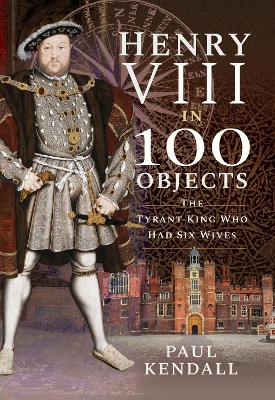In 100 Objects
1 total work
Henry VIII is one of history's most memorable monarchs. Popularly known for his six wives, and the unfortunate fate which befell Anne Boleyn and Catherine Howard, Henry initiated many reforms and changes which still affect our lives today.
The annulment of his marriage to Catherine of Aragon set in motion the separation of the English church from Rome and the establishment of the Church of England, which in turn led to the dissolution of the monasteries, the hauntingly evocative remains of which can be seen across the United Kingdom. Henry also oversaw the legal union between England and Wales, and he is also known as the father of the Royal Navy', with one of his great warships, the Mary Rose, lost in 1545 and recovered in 1982, becoming one of the most famous wrecks in maritime history.
In addition to the monasteries, other buildings around the UK continue to remind us of the times of the Tudors - there is the site of Greenwich Palace at the Royal Naval College Greenwich, where Henry was born; his great palace at Hampton Court; Lambeth Palace where Thomas More refused to sign the oath to make Henry the Head of the Church, and the Bell Tower in the Tower of London where More was imprisoned before he was beheaded.
Henry's breach with the Pope led to the threat of war with Catholic France and Spain, which prompted Henry to construct a series of powerful forts around the English and Welsh coasts. These elegant and symmetrical defensive structures are still awe-inspiring.
In this engaging and hugely informative book, the author takes us on a journey across the country, from Deal Castle on the south coast, to Tower Green where Anne Boleyn and Catherine Howard lost their heads, and far north to Rievaulx Abbey in Yorkshire. Along the way we see places where Henry stayed, where the Mary Rose was recovered, the homes of his consorts and Smithfield where prominent individuals convicted of heresy were burned at the stake. Travel, then, not just across the country, but also back in time through 100 objects from the days of the second Tudor monarch - Henry VIII.
The annulment of his marriage to Catherine of Aragon set in motion the separation of the English church from Rome and the establishment of the Church of England, which in turn led to the dissolution of the monasteries, the hauntingly evocative remains of which can be seen across the United Kingdom. Henry also oversaw the legal union between England and Wales, and he is also known as the father of the Royal Navy', with one of his great warships, the Mary Rose, lost in 1545 and recovered in 1982, becoming one of the most famous wrecks in maritime history.
In addition to the monasteries, other buildings around the UK continue to remind us of the times of the Tudors - there is the site of Greenwich Palace at the Royal Naval College Greenwich, where Henry was born; his great palace at Hampton Court; Lambeth Palace where Thomas More refused to sign the oath to make Henry the Head of the Church, and the Bell Tower in the Tower of London where More was imprisoned before he was beheaded.
Henry's breach with the Pope led to the threat of war with Catholic France and Spain, which prompted Henry to construct a series of powerful forts around the English and Welsh coasts. These elegant and symmetrical defensive structures are still awe-inspiring.
In this engaging and hugely informative book, the author takes us on a journey across the country, from Deal Castle on the south coast, to Tower Green where Anne Boleyn and Catherine Howard lost their heads, and far north to Rievaulx Abbey in Yorkshire. Along the way we see places where Henry stayed, where the Mary Rose was recovered, the homes of his consorts and Smithfield where prominent individuals convicted of heresy were burned at the stake. Travel, then, not just across the country, but also back in time through 100 objects from the days of the second Tudor monarch - Henry VIII.
